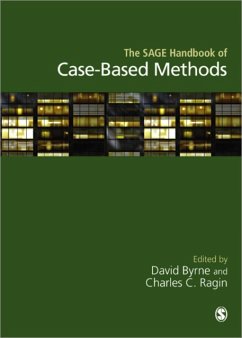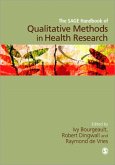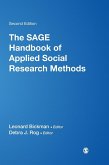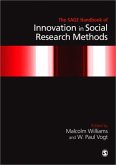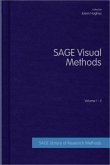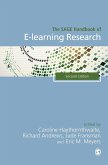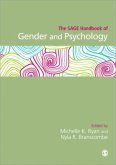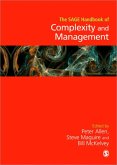The SAGE Handbook of Case-Based Methods
Herausgeber: Byrne, David; Ragin, Charles Christopher
The SAGE Handbook of Case-Based Methods
Herausgeber: Byrne, David; Ragin, Charles Christopher
- Broschiertes Buch
- Merkliste
- Auf die Merkliste
- Bewerten Bewerten
- Teilen
- Produkt teilen
- Produkterinnerung
- Produkterinnerung
This handbook provides a clear, critical examination of case-oriented research. It defines case-based social research as a subfield of methodology.
Andere Kunden interessierten sich auch für
![The SAGE Handbook of Qualitative Methods in Health Research The SAGE Handbook of Qualitative Methods in Health Research]() The SAGE Handbook of Qualitative Methods in Health Research63,99 €
The SAGE Handbook of Qualitative Methods in Health Research63,99 €![The SAGE Handbook of Applied Social Research Methods The SAGE Handbook of Applied Social Research Methods]() Leonard BickmanThe SAGE Handbook of Applied Social Research Methods187,99 €
Leonard BickmanThe SAGE Handbook of Applied Social Research Methods187,99 €![The SAGE Handbook of Innovation in Social Research Methods The SAGE Handbook of Innovation in Social Research Methods]() The SAGE Handbook of Innovation in Social Research Methods67,99 €
The SAGE Handbook of Innovation in Social Research Methods67,99 €![Sage Visual Methods Sage Visual Methods]() Sage Visual Methods1.352,99 €
Sage Visual Methods1.352,99 €![The SAGE Handbook of E-learning Research The SAGE Handbook of E-learning Research]() The SAGE Handbook of E-learning Research191,99 €
The SAGE Handbook of E-learning Research191,99 €![The SAGE Handbook of Gender and Psychology The SAGE Handbook of Gender and Psychology]() The SAGE Handbook of Gender and Psychology190,99 €
The SAGE Handbook of Gender and Psychology190,99 €![The SAGE Handbook of Complexity and Management The SAGE Handbook of Complexity and Management]() The SAGE Handbook of Complexity and Management192,99 €
The SAGE Handbook of Complexity and Management192,99 €-
-
-
This handbook provides a clear, critical examination of case-oriented research. It defines case-based social research as a subfield of methodology.
Hinweis: Dieser Artikel kann nur an eine deutsche Lieferadresse ausgeliefert werden.
Hinweis: Dieser Artikel kann nur an eine deutsche Lieferadresse ausgeliefert werden.
Produktdetails
- Produktdetails
- Verlag: SAGE Publications Ltd
- Seitenzahl: 562
- Erscheinungstermin: 26. März 2013
- Englisch
- Abmessung: 244mm x 170mm x 30mm
- Gewicht: 988g
- ISBN-13: 9781446270448
- ISBN-10: 1446270440
- Artikelnr.: 36804770
- Herstellerkennzeichnung
- Libri GmbH
- Europaallee 1
- 36244 Bad Hersfeld
- gpsr@libri.de
- Verlag: SAGE Publications Ltd
- Seitenzahl: 562
- Erscheinungstermin: 26. März 2013
- Englisch
- Abmessung: 244mm x 170mm x 30mm
- Gewicht: 988g
- ISBN-13: 9781446270448
- ISBN-10: 1446270440
- Artikelnr.: 36804770
- Herstellerkennzeichnung
- Libri GmbH
- Europaallee 1
- 36244 Bad Hersfeld
- gpsr@libri.de
David Byrne is Emeritus Professor of Sociology and Applied Social Sciences at the University of Durham. He has published widely on the methodology of social research, for example, in Interpreting Quantitative Data (2002) and with Charles Ragin edited The SAGE Handbook of Case Based Methods (2009). His major theoretical engagement is with the deployment of the complexity frame of reference across the social sciences--see Complexity Theory and the Social Sciences: The State of the Art (with Gillian Callaghan, 2011) with a particular focus on application to policy and practice. His current research focus is on the implications of the transition to the post-industrial in welfare capitalism--Paying for the Welfare State in the 21st Century (with Sally Ruane, 2011) and Class After Industry (2018). Charles C. Ragin spent most of his youth in Texas and the southeastern United States. He attended the University of Texas at Austin as an undergraduate and received his BA degree in 1972 at the age of 19. That same year he began graduate work in sociology at the University of North Carolina at Chapel Hill and received his PhD in 1975. From 1975 until 2001, he lived in the Midwest, teaching first at Indiana University and then at Northwestern University. He headed west in 2001, where he spent just over a decade at University of Arizona-Tucson. In 2012, he joined the faculty at the University of California-Irvine, where he is currently the Chancellor′s Professor of Sociology. He is best known for developing a methodological alternative to conventional research methods, using formal set-theoretic techniques for comparative research. His many publications address broad issues in politics and society, with topics ranging from the causes of ethnic political mobilization to the shaping of the welfare state in advanced capitalist countries. He has written several books including Intersectional Inequality: Race, Class, Test Scores and Poverty (with Peer Fiss, 2017). Redesigning Social Inquiry: Fuzzy Sets and Beyond (2008) Fuzzy-Set Social Science (2000). His book The Comparative Method: Moving Beyond Qualitative and Quantitative Strategies (1987) won the 1989 Stein Rokkan Prize of the International Social Science Council of UNESCO. In 2014 he received the Paul F. Lazarsfeld Award of the American Sociological Association. He is married to Mary Driscoll, and they have two sons, Andrew and Daniel.
INTRODUCTION: Case-Based Methods: Why We Need Them; What They Are; How to
Do Them - David Byrne
PART ONE: THE METHODOLOGICAL CONTEXT OF CASE-BASED METHODS
Complexity and Case - David L Harvey
The Contextualist Approach to Social Science Methodology - Lars Mjøset
Reflexivity, Realism and the Process of Casing - Bob Carter and Alison
Sealey
Single-Case Probabilities - Malcolm Williams and Wendy Dyer
Complex Realist and Configurational Approaches to Cases: A Radical
Synthesis - David Byrne
PART TWO: METHODS AND TECHNIQUES OF CASE-BASED RESEARCH
Typologies - Ways of Sorting Things Out
Explanatory Typologies in Qualitative Analysis - Colin Elman
Introducing Cluster Analysis: What Can It Teach Us about the Case? - Emma
Uprichard
Visualizing Types: The Potential of Correspondence Analysis - Dianne
Phillips and John Phillips
How Classification Works, Or Doesn¿t: The Case of Chronic Pain - Emma
Whelan
Quantitative Approaches to Case Based Methods
Case-Centred Methods and Quantitative Analysis - Ray Kent
The Logic and Assumptions of MDSO - MSDO Designs - Gisèle De Meur and Alain
Gottcheiner
The Case for Qualitative Comparative Analysis (QCA): Adding Leverage for
Thick Cross-Case Comparison - Benoît Rihoux and Bojana Lobe
On the Duality of Cases and Variables: Correspondence Analysis (CA) and
Qualitative Comparative Analysis (QCA) - Ronald L Breiger
Using Cluster Analysis, Qualitative Comparative Analysis and NVivo in
Relation to the Establishment of Causal Configurations with Pre-existing
Large N Datasets: Machining Hermeneutics - David Byrne
Qualitative Approaches to Case-Based Research
Computer-Based Qualitative Methods in Case-Study Research - Nigel Fielding
and Richard Warnes
Extending the Ethnographic Case Study - Seán Ó Riain
Scope in Case-Study Research - Gary Goertz and James Mahoney
Small-N Access Cases to Refine Theories of Social Exclusion and Access to
Socially Excluded Individuals and Groups - Nick Emmel and Kahryn Hughes
Using Comparative Data: A Systems Approach to a Multiple Case Study - Fred
Carden
PART THREE: CASE-BASED METHODS IN DISCIPLINES AND FIELDS
Making the Most of an Historical Case Study: Configuration, Sequence,
Casing, and the US Old-Age Pension Movement - Edwin Amenta
Poetry and History: The Case for Literary Evidence - John Walton
Social Interactions and the Demand for Sport: Cluster Analysis in Economics
- Paul Downward and Joseph Riordan
The Proper Relationship of Comparative-Historical Analysis to Statistical
Analysis: Subordination, Integration or Separation? - James Mahoney and P
Larkin Terrie
Case Studies and the Configurational Analysis of Organizational Phenomena -
Peer C Fiss
The Case in Medicine - Frances Griffiths
Team-Based Aggregation of Qualitative Case Study Data in Health Care
Contexts: Challenges and Learning - Sue Dopson, Ewan Ferlie, Louise
Fitzgerald and Louise Locock
Working with Cases in Development Contexts: Some Insights from an Outlier -
Pip Bevan
Non-Nested and Nested Cases in a Socioeconomic Village Study - Wendy Olsen
Causality and Interpretation in Qualitative Policy-Related Research - David
Byrne, Wendy Olsen and Sandra Duggan
Reflections on Casing and Case-Oriented Research - Charles C Ragin
Do Them - David Byrne
PART ONE: THE METHODOLOGICAL CONTEXT OF CASE-BASED METHODS
Complexity and Case - David L Harvey
The Contextualist Approach to Social Science Methodology - Lars Mjøset
Reflexivity, Realism and the Process of Casing - Bob Carter and Alison
Sealey
Single-Case Probabilities - Malcolm Williams and Wendy Dyer
Complex Realist and Configurational Approaches to Cases: A Radical
Synthesis - David Byrne
PART TWO: METHODS AND TECHNIQUES OF CASE-BASED RESEARCH
Typologies - Ways of Sorting Things Out
Explanatory Typologies in Qualitative Analysis - Colin Elman
Introducing Cluster Analysis: What Can It Teach Us about the Case? - Emma
Uprichard
Visualizing Types: The Potential of Correspondence Analysis - Dianne
Phillips and John Phillips
How Classification Works, Or Doesn¿t: The Case of Chronic Pain - Emma
Whelan
Quantitative Approaches to Case Based Methods
Case-Centred Methods and Quantitative Analysis - Ray Kent
The Logic and Assumptions of MDSO - MSDO Designs - Gisèle De Meur and Alain
Gottcheiner
The Case for Qualitative Comparative Analysis (QCA): Adding Leverage for
Thick Cross-Case Comparison - Benoît Rihoux and Bojana Lobe
On the Duality of Cases and Variables: Correspondence Analysis (CA) and
Qualitative Comparative Analysis (QCA) - Ronald L Breiger
Using Cluster Analysis, Qualitative Comparative Analysis and NVivo in
Relation to the Establishment of Causal Configurations with Pre-existing
Large N Datasets: Machining Hermeneutics - David Byrne
Qualitative Approaches to Case-Based Research
Computer-Based Qualitative Methods in Case-Study Research - Nigel Fielding
and Richard Warnes
Extending the Ethnographic Case Study - Seán Ó Riain
Scope in Case-Study Research - Gary Goertz and James Mahoney
Small-N Access Cases to Refine Theories of Social Exclusion and Access to
Socially Excluded Individuals and Groups - Nick Emmel and Kahryn Hughes
Using Comparative Data: A Systems Approach to a Multiple Case Study - Fred
Carden
PART THREE: CASE-BASED METHODS IN DISCIPLINES AND FIELDS
Making the Most of an Historical Case Study: Configuration, Sequence,
Casing, and the US Old-Age Pension Movement - Edwin Amenta
Poetry and History: The Case for Literary Evidence - John Walton
Social Interactions and the Demand for Sport: Cluster Analysis in Economics
- Paul Downward and Joseph Riordan
The Proper Relationship of Comparative-Historical Analysis to Statistical
Analysis: Subordination, Integration or Separation? - James Mahoney and P
Larkin Terrie
Case Studies and the Configurational Analysis of Organizational Phenomena -
Peer C Fiss
The Case in Medicine - Frances Griffiths
Team-Based Aggregation of Qualitative Case Study Data in Health Care
Contexts: Challenges and Learning - Sue Dopson, Ewan Ferlie, Louise
Fitzgerald and Louise Locock
Working with Cases in Development Contexts: Some Insights from an Outlier -
Pip Bevan
Non-Nested and Nested Cases in a Socioeconomic Village Study - Wendy Olsen
Causality and Interpretation in Qualitative Policy-Related Research - David
Byrne, Wendy Olsen and Sandra Duggan
Reflections on Casing and Case-Oriented Research - Charles C Ragin
INTRODUCTION: Case-Based Methods: Why We Need Them; What They Are; How to
Do Them - David Byrne
PART ONE: THE METHODOLOGICAL CONTEXT OF CASE-BASED METHODS
Complexity and Case - David L Harvey
The Contextualist Approach to Social Science Methodology - Lars Mjøset
Reflexivity, Realism and the Process of Casing - Bob Carter and Alison
Sealey
Single-Case Probabilities - Malcolm Williams and Wendy Dyer
Complex Realist and Configurational Approaches to Cases: A Radical
Synthesis - David Byrne
PART TWO: METHODS AND TECHNIQUES OF CASE-BASED RESEARCH
Typologies - Ways of Sorting Things Out
Explanatory Typologies in Qualitative Analysis - Colin Elman
Introducing Cluster Analysis: What Can It Teach Us about the Case? - Emma
Uprichard
Visualizing Types: The Potential of Correspondence Analysis - Dianne
Phillips and John Phillips
How Classification Works, Or Doesn¿t: The Case of Chronic Pain - Emma
Whelan
Quantitative Approaches to Case Based Methods
Case-Centred Methods and Quantitative Analysis - Ray Kent
The Logic and Assumptions of MDSO - MSDO Designs - Gisèle De Meur and Alain
Gottcheiner
The Case for Qualitative Comparative Analysis (QCA): Adding Leverage for
Thick Cross-Case Comparison - Benoît Rihoux and Bojana Lobe
On the Duality of Cases and Variables: Correspondence Analysis (CA) and
Qualitative Comparative Analysis (QCA) - Ronald L Breiger
Using Cluster Analysis, Qualitative Comparative Analysis and NVivo in
Relation to the Establishment of Causal Configurations with Pre-existing
Large N Datasets: Machining Hermeneutics - David Byrne
Qualitative Approaches to Case-Based Research
Computer-Based Qualitative Methods in Case-Study Research - Nigel Fielding
and Richard Warnes
Extending the Ethnographic Case Study - Seán Ó Riain
Scope in Case-Study Research - Gary Goertz and James Mahoney
Small-N Access Cases to Refine Theories of Social Exclusion and Access to
Socially Excluded Individuals and Groups - Nick Emmel and Kahryn Hughes
Using Comparative Data: A Systems Approach to a Multiple Case Study - Fred
Carden
PART THREE: CASE-BASED METHODS IN DISCIPLINES AND FIELDS
Making the Most of an Historical Case Study: Configuration, Sequence,
Casing, and the US Old-Age Pension Movement - Edwin Amenta
Poetry and History: The Case for Literary Evidence - John Walton
Social Interactions and the Demand for Sport: Cluster Analysis in Economics
- Paul Downward and Joseph Riordan
The Proper Relationship of Comparative-Historical Analysis to Statistical
Analysis: Subordination, Integration or Separation? - James Mahoney and P
Larkin Terrie
Case Studies and the Configurational Analysis of Organizational Phenomena -
Peer C Fiss
The Case in Medicine - Frances Griffiths
Team-Based Aggregation of Qualitative Case Study Data in Health Care
Contexts: Challenges and Learning - Sue Dopson, Ewan Ferlie, Louise
Fitzgerald and Louise Locock
Working with Cases in Development Contexts: Some Insights from an Outlier -
Pip Bevan
Non-Nested and Nested Cases in a Socioeconomic Village Study - Wendy Olsen
Causality and Interpretation in Qualitative Policy-Related Research - David
Byrne, Wendy Olsen and Sandra Duggan
Reflections on Casing and Case-Oriented Research - Charles C Ragin
Do Them - David Byrne
PART ONE: THE METHODOLOGICAL CONTEXT OF CASE-BASED METHODS
Complexity and Case - David L Harvey
The Contextualist Approach to Social Science Methodology - Lars Mjøset
Reflexivity, Realism and the Process of Casing - Bob Carter and Alison
Sealey
Single-Case Probabilities - Malcolm Williams and Wendy Dyer
Complex Realist and Configurational Approaches to Cases: A Radical
Synthesis - David Byrne
PART TWO: METHODS AND TECHNIQUES OF CASE-BASED RESEARCH
Typologies - Ways of Sorting Things Out
Explanatory Typologies in Qualitative Analysis - Colin Elman
Introducing Cluster Analysis: What Can It Teach Us about the Case? - Emma
Uprichard
Visualizing Types: The Potential of Correspondence Analysis - Dianne
Phillips and John Phillips
How Classification Works, Or Doesn¿t: The Case of Chronic Pain - Emma
Whelan
Quantitative Approaches to Case Based Methods
Case-Centred Methods and Quantitative Analysis - Ray Kent
The Logic and Assumptions of MDSO - MSDO Designs - Gisèle De Meur and Alain
Gottcheiner
The Case for Qualitative Comparative Analysis (QCA): Adding Leverage for
Thick Cross-Case Comparison - Benoît Rihoux and Bojana Lobe
On the Duality of Cases and Variables: Correspondence Analysis (CA) and
Qualitative Comparative Analysis (QCA) - Ronald L Breiger
Using Cluster Analysis, Qualitative Comparative Analysis and NVivo in
Relation to the Establishment of Causal Configurations with Pre-existing
Large N Datasets: Machining Hermeneutics - David Byrne
Qualitative Approaches to Case-Based Research
Computer-Based Qualitative Methods in Case-Study Research - Nigel Fielding
and Richard Warnes
Extending the Ethnographic Case Study - Seán Ó Riain
Scope in Case-Study Research - Gary Goertz and James Mahoney
Small-N Access Cases to Refine Theories of Social Exclusion and Access to
Socially Excluded Individuals and Groups - Nick Emmel and Kahryn Hughes
Using Comparative Data: A Systems Approach to a Multiple Case Study - Fred
Carden
PART THREE: CASE-BASED METHODS IN DISCIPLINES AND FIELDS
Making the Most of an Historical Case Study: Configuration, Sequence,
Casing, and the US Old-Age Pension Movement - Edwin Amenta
Poetry and History: The Case for Literary Evidence - John Walton
Social Interactions and the Demand for Sport: Cluster Analysis in Economics
- Paul Downward and Joseph Riordan
The Proper Relationship of Comparative-Historical Analysis to Statistical
Analysis: Subordination, Integration or Separation? - James Mahoney and P
Larkin Terrie
Case Studies and the Configurational Analysis of Organizational Phenomena -
Peer C Fiss
The Case in Medicine - Frances Griffiths
Team-Based Aggregation of Qualitative Case Study Data in Health Care
Contexts: Challenges and Learning - Sue Dopson, Ewan Ferlie, Louise
Fitzgerald and Louise Locock
Working with Cases in Development Contexts: Some Insights from an Outlier -
Pip Bevan
Non-Nested and Nested Cases in a Socioeconomic Village Study - Wendy Olsen
Causality and Interpretation in Qualitative Policy-Related Research - David
Byrne, Wendy Olsen and Sandra Duggan
Reflections on Casing and Case-Oriented Research - Charles C Ragin

